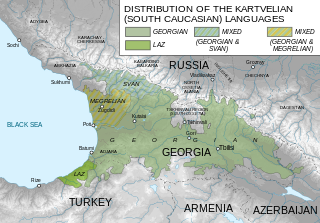This page is based on this
Wikipedia article Text is available under the
CC BY-SA 4.0 license; additional terms may apply.
Images, videos and audio are available under their respective licenses.

The Duchy of Kldekari, sometimes also referred as County of Trialeti was a duchy (saeristavo) within the kingdom of Georgia from 876-1184. Ruled by a powerful dynasty of Liparitids-Baghuashi, the duchy existed in the south-western parts of modern Kvemo Kartli province, and, despite its small size, created problems for the Bagrationi kings as they sought to bring all Georgian vassals and principalities into a unified state.
The Liparitids, also known as Baghuashi (ბაღჳაში), were a noble house (didebuli) in medieval Georgia, with notable members from the 9th to 12th centuries and famed for their powerful resistance to the consolidation of the Bagratid royal authority in the Kingdom of Georgia. A principal branch of the Liparitid house, known later under the name of Orbeli or Orbeliani, were expelled, in 1177 after a failed coup to Armenia where they came to be known as the Orbelian Dynasty, and controlled Syunik and Vayots Dzor until the Invasions of Tamerlane. That said: the family gave origin to several cadet branches which have survived in Georgia for several centuries.
David I was a Georgian Bagratid Prince and curopalates of Iberia/Kartli from 876 to 881.
Nasra or Nasri was a Georgian prince of the Bagratid dynasty of Tao-Klarjeti involved and eventually killed in a dynastic war with his relatives.
Grigol was a Prince and Chorepiscopus of Kakheti in eastern Georgia from 786 to 827.
Vache was a Prince and Chorepiscopus of Kakheti in eastern Georgia from 827 to 839. He came of the Kvabulidze clan and was installed by the Gardabanian community after the death of his predecessor Grigol. He was succeeded by Samuel.
Samuel, of the Donauri family, was a Prince and Chorepiscopus of Kakheti in eastern Georgia from 839 to 861. After the death of his predecessor Vache, Samuel was elected as prince by the Gardabanian nobility who dominated the politics of Kakheti at the time. He was allied with the Arab emir of Tiflis in the revolt against the Caliphate and hence Kakheti became targeted by the Arab punitive expeditions led by Khalid b. Yazid (840–42) and Bugha the Turk (853–54). Samuel was succeeded by his nephew, Gabriel.
P'adla I, of the Arevmaneli clan, was a Prince and chorepiscopus of Kakheti in eastern Georgia from 881 to 893. He attained to his office after suppressing the Donauri family, which had ruled Kakheti from 839 to 881. During his rule, Padla succeeded in recovering the district of Gardabani conquered by the Arab emir of Tiflis from his predecessor Gabriel.
Kvirike I was a Prince and Chorepiscopus of Kakheti in eastern Georgia from 893 to 918.
P'adla II was a Prince and Chorepiscopus of Kakheti in eastern Georgia from 918 to 929.
Kvirike II was a Prince and Chorepiscopus of Kakheti in eastern Georgia from 929 to 976.
David was a Prince and Chorepiscopus of Kakheti in eastern Georgia from 976 to 1010; son and successor of Kvirike II. A major menace to his rule came from the Georgian Bagratid king Bagrat III who had unified the core Georgian polities under his crown and sought to incorporate Kakheti into his realm. The war between the two rulers ended in Bagrat’s victory, but David was able to preserve his crown. He was succeeded by his son Kvirike III.

Kvirike III the Great was a ruler of Kakheti and Hereti in eastern Georgia from 1010 to 1037 or 1039.
Gagik was a King of Kakheti and Hereti in eastern Georgia from 1039 to 1058.
Aghsartan I was a King of Kakheti and Hereti in eastern Georgia from 1058 until his death in 1084.
Kvirike IV was a King of Kakheti and Hereti in eastern Georgia from 1084 to 1102.
Aghsartan II, was the last King of medieval Kakheti and Hereti in eastern Georgia from 1102 to 1105.
Bagrat I was the King of Abkhazia between 882 and 894. He was the second son of Demetrius II of the Anchabadze dynasty.

Khandzta was a medieval Georgian monastery founded by Gregory of Khandzta in 782 AD. It has been identified as probably being the ruined monastery known as Porta, in Pirnali village, Artvin province, Turkey.

The Kingdom of Kakheti-Hereti or just the First Kingdom of Kakheti was a early Medieval monarchy in eastern Georgia, centered at the province of Kakheti, with its capital first at Telavi. It emerged in c. 1014 AD, under the leadership of energetic ruler of principality of Kakheti, Kvirike III the Great that finally defeated the ruler of Hereti and crowned himself as a king of unified realms of Kakheti and Hereti. From this time on, until 1104, kingdom was an independent and separated state from the united Kingdom of Georgia. The kingdom included territories from riv. Ksani to Alijanchay river and from Didoeti to southwards along the river of Mtkvari.




